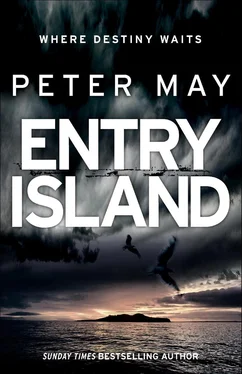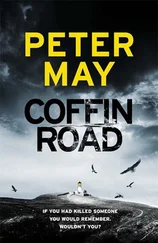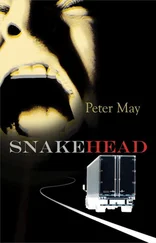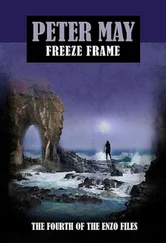She stared at him in disbelief, and it was several moments before she found her voice. ‘Who?’
He hesitated. ‘Your cousin Jack.’
She turned deathly pale. ‘Jack? Are you sure?’
He nodded. ‘Let’s go and get a coffee, Kirsty. And if you’ll give me the time, I’ve got a very long story to tell you.’
Sime followed the path back up from the shingle shore, between the remains of the blackhouses that had once made up the village of Baile Mhanais.
How foolish had Jack Aitkens been to imagine that he could inherit any of this? Not just the money, but the history, the lives lived and lost. Even had his claim for the inheritance been upheld, what might have seemed a fortune a hundred and fifty years ago was only worth a fraction of that now. Certainly not worth killing or dying for. Or spending the rest of your life in a wheelchair in a prison cell.
The wind tugged at his hair, and sunlight spilled down the hillside, the shadows of clouds chasing it across the ruins of the old settlement. He wondered in which of these houses his ancestor had grown up. Where his mother had given birth to him and his sisters. Where his father had died, shot to death as he tried to feed them.
It was hard to picture it the way it had been in his dream. As he had seen it in the paintings. Constables beating the villagers to the ground, men setting roofs on fire. All that remained were the ghosts of memories, and the endless wind whistling among the ruins.
At the top of the village, he stopped and looked up. Kirsty was standing on the hill by the remains of the old sheep fank, just as Ciorstaidh had done before her. Her hair blowing out behind her in the wind. It was impossible now for him to separate the two. Almost equally difficult to draw a line between himself and his ancestor. This was not only a pilgrimage to their past, but a journey in search of a future. For him an escape from a life barely lived. For her, release from the prison that had been Entry Island.
She waved, and he climbed the hill to feel the radiance of those blue eyes light up his life. She said, ‘The standing stones are over there. At the far side of the beach.’
He smiled. ‘Let’s take a look, then.’ They began their descent towards the beach and he took her hand to steady her as she almost stumbled over the uneven ground.
And he wondered if it had always been his destiny to keep the promise that the young Sime Mackenzie had made so long ago. And if he and Kirsty were somehow meant to fulfil the love that their ancestors never could. Only if you believed in destiny, he thought. Or fate. And Sime had never been quite sure that he believed in either.
Postscript
What happened to Michaél
Extract from Sime’s diary
March, 1848
I sit writing this tonight with fear in my heart. It is my first entry since arriving at the lumber camp four months ago. There has been no time to keep a record. Even if there had been, there is no privacy here, and anyway I’ve had little inclination.
We live in long sheds that make me think of the Lazarettos on Grosse Île, sleeping on two tiers of bunk beds that range along opposite walls. You can’t leave money or personal belongings here. Nothing is safe. You carry everything of value with you at all times.
In the time we have been here we have worked, eaten and slept. It is all we have done. Long, hard, ball-busting days felling and stripping trees, dragging them with teams of horses to the Gatineau River. For the moment the logs sit out on the ice. Great mountains of them. But in the spring the melting iceflows will carry them downstream to the big commercial sawmills at Quebec City.
They feed us well enough, at long tables like animal troughs. They need to fill our bellies to fuel the work we do. It is relentless, and the only day we have to ourselves is the Sabbath. A few of us who hail from the islands gather round on Sundays while I read from the Gaelic bible and we sing our psalms. The French think we are mad. An irreligious lot, they are. Catholics, of course.
The company provides alcohol, too. Their way of keeping us happy. But you daren’t drink too much during the week, or you’re not fit for working the next day. So Saturday night is the night for drinking. And pretty wild it can get sometimes, too.
From time to time the Scots organise a ceilidh. We have a fiddler among us, and one of the fellas has a squeeze box. No women, of course. Just drinking and gambling and some mad dancing once the booze starts to flow. Which is when the French join in. They’re pretty reticent at first, but once they get a drink in them they’re worse than the Scots.
There was a ceilidh earlier tonight, and I was sitting playing cards with a bunch of the boys in a corner of the recreation shed when I first became aware of the fight.
The place was heaving, music ringing around the rafters. The bar had been doing a roaring trade, and most of the men had a skinful. But there were voices raised now above the melee, angry querulous voices that cut through the smoke and the noise. A circle had formed, and men were pushing back from the centre of it on all sides. Me and several of the others stood up on the tables to see what was happening.
In the centre of the circle, two huge men were slugging it out. Big knuckled fists smashing into bloodied faces. One of them was Michaél. He’s developed a liking for the drink while we’ve been here, and after a few he gets argumentative, and violent sometimes. He has let his beard grow back, and his hair is longer again, and he presents a scary figure when he gets riled.
But he picked a brute of a man to get into a fight with tonight. A Frenchman called The Bear. At least, that’s what we call him. L’ours is the French name for him. A giant of a man with more body hair than I’ve ever seen, a big beard and a shaven head. In a fight with a real bear you wouldn’t bet against him.
I immediately jumped off the table and ploughed my way through the crowd. Me and several of the others grabbed Michaél and pulled him away from the swinging fists of The Bear, and the French did the same with their man, both combatants fighting against constraining arms.
Finally the struggle subsided, and the two men stood glaring at each other across the circle at the centre of the storm, breathing like horses after a gallop, steam rising off both of them, and blood on the floor.
‘We’ll finish this tomorrow,’ The Bear growled in his thickly accented English.
‘Fockin’ right we will!’
‘It’s the sabbath tomorrow,’ I said.
‘Fock the sabbath. We’ll settle this like men. The clearing at the far side of the old camp. Midday.’
‘It doesn’t make you men to fight,’ I shouted at Michaél. ‘More like schoolboys!’
‘You keep the fuck out of this!’ The Bear glared at me. Then he turned his loathing back on Michaél. ‘Midi it is,’ he said. ‘And you’d better be there.’
‘You can fockin’ count on it!’
I have tried everything I can to dissuade him. It seems to me that The Bear is the bigger, stronger man, and that Michaél is going to take a beating. And when the blood is up, men like that have no idea when to stop. But honour is at stake, and Michaél won’t hear of backing out, though I’m sure he’ll regret it in the morning when he sobers up in the cold light of day.
The truth is, I fear for his life.
The old camp is about a mile away from where they built the new one and there is a large cleared area on the far side of it. Just about every man jack of us was gathered there at midday on the sabbath. I went, not to watch the fight, but to look out for Michaél and try to prevent him from being too badly hurt. What a miserable bloody failure I was at it, too!
Читать дальше












